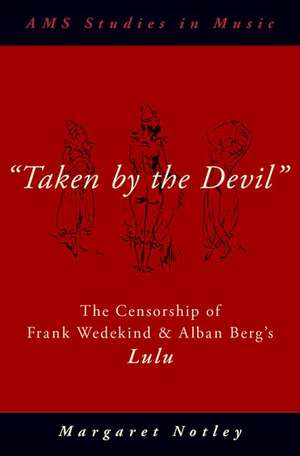"Taken by the Devil": The Censorship of Frank Wedekind and Alban Berg's Lulu: AMS Studies in Music
Autor Margaret Notleyen Limba Engleză Hardback – 15 noi 2019
Din seria AMS Studies in Music
- 9%
 Preț: 441.64 lei
Preț: 441.64 lei - 10%
 Preț: 440.53 lei
Preț: 440.53 lei -
 Preț: 329.41 lei
Preț: 329.41 lei -
 Preț: 277.43 lei
Preț: 277.43 lei - 20%
 Preț: 259.69 lei
Preț: 259.69 lei - 24%
 Preț: 396.33 lei
Preț: 396.33 lei - 27%
 Preț: 376.39 lei
Preț: 376.39 lei - 12%
 Preț: 293.81 lei
Preț: 293.81 lei - 20%
 Preț: 258.53 lei
Preț: 258.53 lei - 15%
 Preț: 263.82 lei
Preț: 263.82 lei - 5%
 Preț: 233.64 lei
Preț: 233.64 lei -
 Preț: 317.60 lei
Preț: 317.60 lei - 27%
 Preț: 360.45 lei
Preț: 360.45 lei - 30%
 Preț: 495.66 lei
Preț: 495.66 lei - 27%
 Preț: 387.19 lei
Preț: 387.19 lei - 18%
 Preț: 417.30 lei
Preț: 417.30 lei - 27%
 Preț: 349.20 lei
Preț: 349.20 lei - 11%
 Preț: 356.33 lei
Preț: 356.33 lei - 13%
 Preț: 298.63 lei
Preț: 298.63 lei - 17%
 Preț: 302.06 lei
Preț: 302.06 lei - 11%
 Preț: 358.23 lei
Preț: 358.23 lei - 16%
 Preț: 635.67 lei
Preț: 635.67 lei
Preț: 342.73 lei
Preț vechi: 444.10 lei
-23% Nou
Puncte Express: 514
Preț estimativ în valută:
65.58€ • 70.13$ • 54.68£
65.58€ • 70.13$ • 54.68£
Carte tipărită la comandă
Livrare economică 07-14 aprilie
Preluare comenzi: 021 569.72.76
Specificații
ISBN-13: 9780190069865
ISBN-10: 0190069864
Pagini: 300
Ilustrații: 40 illustrations; 14 photographs
Dimensiuni: 239 x 155 x 28 mm
Greutate: 0.61 kg
Editura: Oxford University Press
Colecția OUP USA
Seria AMS Studies in Music
Locul publicării:New York, United States
ISBN-10: 0190069864
Pagini: 300
Ilustrații: 40 illustrations; 14 photographs
Dimensiuni: 239 x 155 x 28 mm
Greutate: 0.61 kg
Editura: Oxford University Press
Colecția OUP USA
Seria AMS Studies in Music
Locul publicării:New York, United States
Recenzii
Margaret Notley's new study is a deep and detailed exploration of the political, editorial, and critical environment surrounding Wedekind's controversial dramas that Alban Berg so skillfully forged into the libretto for his powerful but enigmatic opera Lulu. Notley's results revealed here profoundly fortify our musical understanding of one of the finest operas of the past century.
With this new book Margaret Notley examines the consequences of censorship in the creative process and reception of Frank Wedekind's plays Erdgeist and Die Büchse der Pandora and Alban Berg's opera Lulu. In an engaging account, Notley opens new avenues for interpretation of elements that had hitherto been deemed incongruous in both the plays and the opera. Beyond Berg scholarship, this book is a must read for anyone interested in intersections between music and politics.
Although there can be few operas that so openly bear the scars of censorship as Lulu, this aspect has all too often been neglected by musicologists. Margaret Notley's extensive and detailed investigation of the subject fills a gaping hole in Lulustudies and will be invaluable for Wedekind and Berg scholars alike.
With this new book Margaret Notley examines the consequences of censorship in the creative process and reception of Frank Wedekind's plays Erdgeist and Die Büchse der Pandora and Alban Berg's opera Lulu. In an engaging account, Notley opens new avenues for interpretation of elements that had hitherto been deemed incongruous in both the plays and the opera. Beyond Berg scholarship, this book is a must read for anyone interested in intersections between music and politics.
Although there can be few operas that so openly bear the scars of censorship as Lulu, this aspect has all too often been neglected by musicologists. Margaret Notley's extensive and detailed investigation of the subject fills a gaping hole in Lulustudies and will be invaluable for Wedekind and Berg scholars alike.
Notă biografică
Margaret Notley is the author of Lateness and Brahms: Music and Culture in the Twilight of Viennese Liberalism, AMS Studies in Music (Oxford University Press, 2007) and the editor of Opera after 1900: An Anthology of Critical Essays (2010). Her scholarship has been supported by grants from the Fulbright Scholar Program, National Endowment for the Humanities, and American Philosophical Society, and her work has appeared in Journal of the American Musicological Society, 19th-Century Music, Journal of Musicology, and a number of multi-author volumes. For an article on late nineteenth-century adagios she received the American Musicological Society's Alfred Einstein Award in 2000. From 2001 to 2016, she was a member of the Editorial Board of Journal of Musicology, and she has been an Associate Editor of 19th-Century Music since 2006.
